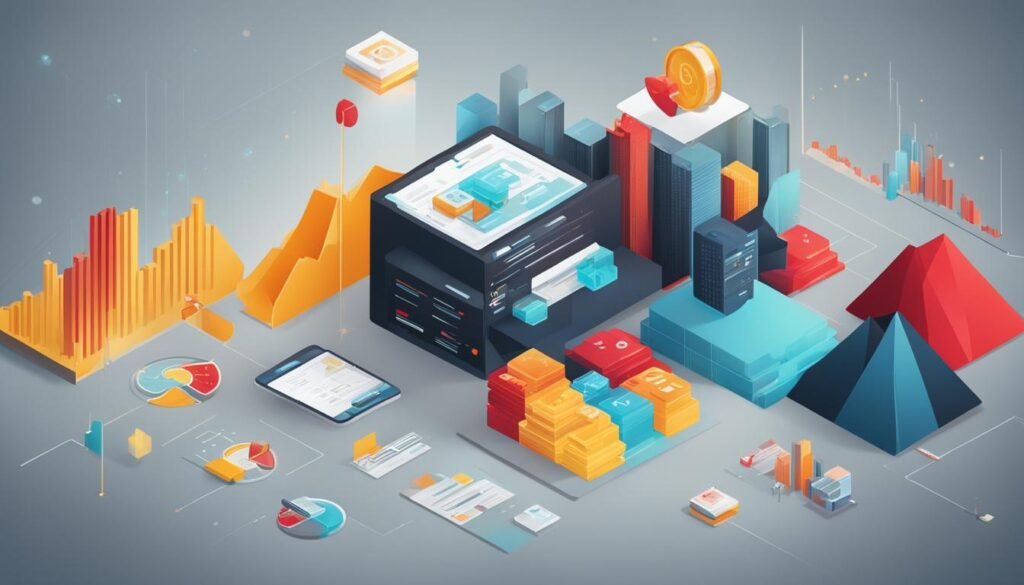Many organizations recognize the value of data and insights, with data and analytics ranking among the top areas of focus. However, data management and analytics currently do not rank in the top areas where tech leaders spend the majority of their time and effort. There also seems to be a lack of consensus on who is responsible for data governance. While organizations are investing in advanced analytics, data infrastructure modernization, and foundational data management, data monetization is often at the bottom of the list. It is important for organizations to prioritize data and insights, as well as have a clear data governance strategy, in order to harness the full potential of data monetization.
Data monetization is the process of leveraging data assets to generate economic benefits and drive business growth. By monetizing data, organizations can create new revenue streams, enhance customer experience, and make informed decisions based on valuable insights. This article will explore the potential of data monetization, different strategies that can be implemented, tools and technologies that can facilitate the process, and the importance of a strong data culture. We will also discuss the challenges and considerations in data monetization, as well as the future trends and benefits of this strategy.
Key Takeaways:
- Data monetization involves leveraging data assets to create economic benefits and drive business growth.
- Organizations should prioritize data and insights and have a clear data governance strategy.
- There are various strategies, tools, and technologies available for effective data monetization.
- Both internal and external data monetization approaches have their own considerations and benefits.
- Data culture plays a crucial role in successful data monetization.
The Potential of Data Monetization
Data monetization offers organizations the potential to unlock economic benefits and create value from their data assets. By leveraging data effectively, organizations can generate new revenue streams, drive business growth, and enhance customer experience. There are various ways to monetize data, including selling data sets, selling insights, embedding data and insights into existing offerings, and partnering with ecosystem partners. Successful data monetization can result in measurable improvements in business performance and provide organizations with a competitive advantage.
Value Creation and Value Realization
Data monetization enables organizations to create value from their data assets. By analyzing and extracting insights from data, organizations can make informed decisions, improve operational efficiency, and optimize processes. Data analytics plays a crucial role in extracting value from data, as it uncovers patterns, trends, and correlations that can drive business growth. Value realization occurs when organizations leverage the insights gained from data monetization efforts to improve business performance, drive revenue growth, reduce costs, and enhance customer satisfaction.
Use Cases
Data monetization can be applied across various industries and business functions. Some common use cases include using data to optimize pricing and promotions, personalize customer experiences, improve supply chain management, and enable targeted marketing campaigns. By leveraging data effectively, organizations can gain a deeper understanding of their customers, identify market trends, and make data-driven decisions. The possibilities for data monetization are vast and depend on the specific industry and business goals of an organization.
Data Monetization Benefits
The benefits of data monetization are numerous. It can lead to measurable improvements in business performance, such as increased revenue, cost savings, and enhanced operational efficiency. Data monetization also enables organizations to create value by delivering personalized experiences to customers, optimizing internal processes, and developing innovative products and services. By effectively monetizing their data, organizations can gain a competitive advantage and drive sustainable growth in today’s data-driven economy.
| Benefits of Data Monetization | Impact on Organizations |
|---|---|
| Increased revenue | Improved financial performance and business growth |
| Cost savings | Efficient resource allocation and reduced operational expenses |
| Enhanced customer experience | Personalized offerings, targeted marketing campaigns, and improved customer satisfaction |
| Optimized internal processes | Streamlined operations, improved decision-making, and increased productivity |
Data Monetization Strategies
To effectively monetize data, organizations need to have a clear data strategy. This involves understanding the types of data that can be monetized, such as raw data, curated data, and third-party insights. Different strategies can be implemented to monetize data, including selling data sets, selling insights, embedding data and insights into existing offerings, and selling data through ecosystem partners. The choice of strategy may vary based on industry needs and challenges. It is important for organizations to assess their data assets and capabilities to determine the most suitable data monetization approach.
Data Types for Monetization
When considering data monetization, organizations should first identify the types of data they possess that have potential value. This can include raw data, such as customer demographic information or purchase history, curated data that has been processed and organized for specific purposes, or third-party insights obtained from external sources. By understanding the different types of data they have, organizations can better determine how to monetize and extract value from each type.
Monetization Strategies
Once the types of data have been identified, organizations can explore various strategies to monetize their data. Selling data sets involves packaging and selling data to other organizations or individuals who can leverage it for their own purposes. Selling insights involves extracting valuable insights from the data and offering them as a service to customers. Embedding data and insights into existing offerings involves integrating data and insights into existing products or services to enhance their value. Selling data through ecosystem partners involves partnering with other organizations in the data ecosystem to create and share value. The choice of strategy will depend on the organization’s goals, capabilities, and industry context.
Assessing Data Assets and Capabilities
In order to determine the most suitable data monetization approach, organizations need to assess their data assets and capabilities. This involves evaluating the quality, quantity, and relevance of their data assets, as well as the technical infrastructure and expertise needed to effectively monetize the data. By conducting a thorough assessment, organizations can identify any gaps or limitations and make informed decisions about the best data monetization strategy for their specific needs.
Data Monetization Tools and Technologies
To successfully monetize data, organizations need to leverage the right tools and technologies. There are various data monetization tools available in the market that can help organizations collect, analyze, and monetize their data. These tools offer capabilities such as data governance, data integration, data analytics, and data visualization. By utilizing the right data monetization tools, organizations can effectively manage their data assets and generate valuable insights that can be monetized.
Benefits of Data Monetization Tools
Data monetization tools provide organizations with the necessary infrastructure and functionality to unlock the value of their data. These tools enable organizations to:
- Collect and consolidate data from various sources
- Analyze data to uncover valuable insights and trends
- Visualize data in a way that is easy to understand and interpret
- Ensure data governance and compliance
- Integrate data with existing systems and workflows
By leveraging these tools, organizations can streamline their data monetization efforts and maximize the return on their data investments.
Choosing the Right Data Monetization Tools
When selecting data monetization tools, organizations should consider their specific needs and requirements. Some key factors to consider include:
- Scalability: Ensure that the tools can handle the volume and variety of data that your organization deals with.
- Integration: Check if the tools can seamlessly integrate with your existing data infrastructure and systems.
- Usability: Evaluate the user-friendliness of the tools and ensure that they can be easily adopted by your team.
- Security: Prioritize tools that have robust security features to protect your data from unauthorized access.
- Cost-effectiveness: Consider the cost of the tools and their potential return on investment.
By carefully evaluating these factors and selecting the right data monetization tools, organizations can unlock the full potential of their data and drive business growth.
| Data Monetization Tool | Main Features |
|---|---|
| Data Governance Platform | Enables organizations to establish data governance policies, standards, and processes to ensure data quality, integrity, and compliance. |
| Data Integration Software | Facilitates the integration of disparate data sources, ensuring data consistency and accuracy. |
| Data Analytics Tools | Allows organizations to analyze data and uncover valuable insights using advanced analytics techniques such as predictive modeling and machine learning. |
| Data Visualization Software | Enables organizations to create interactive visualizations and dashboards to effectively communicate data insights. |
Image source: https://seowriting.ai/32_6.png
Internal vs External Data Monetization
When it comes to data monetization, organizations have the option to either focus on internal data or explore external data sources. Internal data monetization involves leveraging the organization’s own data assets, such as customer data and operational data, to generate revenue and create value. This approach allows organizations to capitalize on the data they already possess and have full control over.
On the other hand, external data monetization involves partnering with external data providers or participating in data marketplaces to access additional data sources for monetization. This approach allows organizations to tap into a wider range of data and gain insights that they may not possess internally. By collaborating with external data providers or participating in data ecosystems, organizations can expand their data monetization opportunities.
Deciding between internal and external data monetization depends on various factors, such as the organization’s data assets, capabilities, and business goals. It is important to assess the quality and quantity of internal data available, as well as the potential benefits and risks of integrating external data sources. Organizations should also consider factors such as data privacy, data governance, and data security when choosing the right approach. Ultimately, the decision should align with the organization’s overall data monetization strategy and objectives.
Value Creation and Value Realization in Data Monetization

Data monetization offers organizations the opportunity to create value from their data and realize its potential benefits. Through data analytics and insights, organizations can unlock valuable information that can drive decision-making, optimize processes, and enhance customer experience. The value creation process begins with extracting insights from data, identifying trends, and uncovering patterns that can inform strategic initiatives. This data-driven approach enables organizations to make informed decisions that can lead to tangible business performance improvements.
Data analytics plays a crucial role in value creation, as it allows organizations to derive meaningful insights and translate them into actionable strategies. By leveraging advanced analytics techniques, such as predictive modeling and machine learning, organizations can identify opportunities, mitigate risks, and optimize their operations. Data analytics also enables organizations to personalize their offerings, target specific customer segments, and improve overall customer satisfaction. The ability to extract value from data is key to successful data monetization and can result in a competitive advantage for organizations.
Value realization, on the other hand, focuses on the actualization of the value created through data monetization efforts. This involves translating the insights and strategies derived from data analytics into measurable outcomes and business results. Organizations can realize value through various means, such as increased revenue, cost savings, improved operational efficiency, and enhanced customer satisfaction. By effectively implementing the strategies and initiatives driven by data insights, organizations can maximize the impact of data monetization and achieve their business goals.
Use Cases of Data Monetization
Data monetization offers organizations the opportunity to unlock the value of their data and create new revenue streams. By effectively leveraging data, organizations can gain valuable insights that drive business growth and enhance customer experiences. Let’s explore some use cases of data monetization in different industries.
1. Improving Operations:
By analyzing operational data, organizations can identify inefficiencies, optimize processes, and reduce costs. For example, a manufacturing company can use sensor data to monitor equipment performance and predict maintenance needs, minimizing downtime and improving productivity.
2. Enhancing Customer Experience:
Data can provide valuable insights into customer behavior and preferences. By analyzing customer data, organizations can deliver personalized experiences, tailor product recommendations, and engage in targeted marketing campaigns. This enhances customer satisfaction and loyalty, ultimately driving revenue growth.
3. Developing New Products and Services:
Data can fuel innovation by identifying market trends and customer needs. For example, a retail company can analyze customer purchase history and preferences to develop new products or services that cater to specific customer segments. This enables organizations to stay ahead of the competition and meet evolving customer demands.
| Industry | Use Case |
|---|---|
| Healthcare | Using patient data to improve diagnosis accuracy and treatment outcomes. |
| Financial Services | Utilizing transaction data to detect fraud patterns and enhance security measures. |
| Retail | Analyzing customer data to personalize marketing campaigns and improve conversion rates. |
| Transportation | Using vehicle sensor data to optimize routes, reduce fuel consumption, and improve logistics. |
These are just a few examples of how organizations can monetize their data. By using data to make informed decisions and creating value from data, organizations can drive business growth and gain a competitive advantage.
Challenges and Considerations in Data Monetization
Data monetization comes with its own set of challenges and considerations. Organizations need to ensure that they have the necessary data processing capabilities to effectively monetize their data. This includes both the technical infrastructure and the analytical expertise to extract insights and create value from the data.
Another challenge is identifying and assessing the data assets that can be monetized. Not all data may be suitable for monetization, and organizations need to carefully evaluate their existing data to determine its value and potential use. This involves understanding the quality, relevance, and uniqueness of the data.
In addition, organizations may need to establish partnerships with data providers or participate in data ecosystems to access additional data sources for monetization. This requires careful consideration of data privacy, data governance, and data security. Organizations must ensure that they have proper mechanisms in place to protect both their own data and the data of their customers.
| Challenge | Consideration |
|---|---|
| Data Processing | Ensure the necessary infrastructure and expertise for data processing and analysis. |
| Data Assets | Identify and assess the value and potential use of existing data assets. |
| Data Partnerships | Establish partnerships with data providers and participate in data ecosystems. |
| Data Privacy and Security | Implement measures to protect data privacy and ensure data security. |
“Data monetization requires organizations to overcome various challenges, from data processing and asset evaluation to establishing partnerships and ensuring data privacy. By addressing these challenges and considering the necessary considerations, organizations can unlock the full potential of data monetization.”
The Role of Data Culture in Data Monetization
A strong data culture is crucial for successful data monetization. It involves fostering a mindset of data-driven decision-making and leveraging data as a strategic asset. Data culture should be ingrained in every level of the organization, from the leadership team to individual employees. The organization’s data must be seen as a valuable resource that can unlock new revenue streams and drive business growth.
In order to build a data culture, organizations need to prioritize data literacy and data-driven thinking. Everybody in the organization must understand the value of data and be willing to participate in data monetization efforts. This includes acquiring the necessary skills to collect, analyze, and interpret data. When individuals are empowered to make data-driven decisions, they can contribute to the organization’s overall success.
Creating a supportive environment is also essential for fostering a strong data culture. This means providing the necessary resources, training, and tools to enable employees to effectively use and monetize data. It also involves creating a culture of collaboration, where individuals feel encouraged to share insights and ideas based on data analysis.
The Benefits of a Data Culture
Organizations that prioritize a data culture can reap numerous benefits. By leveraging their data assets, they can unlock new revenue streams and drive business growth. Additionally, a data culture enables organizations to make informed decisions, optimize processes, and enhance customer experiences. It also promotes innovation and agility, as data-driven insights can uncover new opportunities and drive continuous improvement.
Key Considerations for Building a Data Culture
Building a strong data culture requires careful consideration of several factors:
- Leadership commitment: The leadership team must demonstrate a commitment to data-driven decision-making and actively promote a data culture throughout the organization.
- Data governance: Establishing clear data governance policies and procedures is essential to ensure data quality, privacy, and security.
- Training and education: Providing employees with the necessary training and education to build their data literacy and analytical skills is crucial for fostering a data culture.
- Collaboration and communication: Encouraging collaboration and open communication across departments and teams can facilitate the sharing of insights and best practices.
By prioritizing data culture and building a data-driven organization, businesses can maximize the value of their data assets and effectively monetize their data.
Data Monetization Trends and Future Outlook

Data monetization is a rapidly evolving field, with new trends and developments shaping the way organizations monetize their data assets. To stay ahead of the curve and capitalize on the full potential of data monetization, it is crucial for organizations to stay updated on these trends and embrace emerging models.
The Rise of Data Marketplaces
Data marketplaces are gaining popularity as a platform for buying and selling data. These marketplaces provide a centralized hub where organizations can explore and access a wide range of data sets from various sources. By participating in data marketplaces, organizations can unlock new revenue streams by monetizing their own data assets and also gain access to valuable data from external sources.
Increasing Demand for Data as a Service
The demand for data as a service (DaaS) is on the rise, as organizations recognize the value of accessing high-quality data without the need for extensive data infrastructure investments. DaaS providers offer pre-packaged data sets and insights, enabling organizations to quickly and efficiently leverage data for their specific needs. This trend allows organizations to monetize their data by providing it as a service to other businesses, unlocking new revenue streams and driving business growth.
Adoption of Advanced Analytics and Artificial Intelligence
Advanced analytics and artificial intelligence (AI) technologies are revolutionizing data monetization by enabling organizations to uncover valuable insights and patterns in their data. These technologies can help organizations generate predictive models, optimize processes, and create personalized experiences for customers. By leveraging advanced analytics and AI, organizations can extract maximum value from their data assets and achieve higher monetization potential.
| Data Monetization Trends | Description |
|---|---|
| Rise of Data Marketplaces | Data marketplaces provide a platform for organizations to buy and sell data sets, unlocking new revenue streams and access to valuable external data sources. |
| Increasing Demand for Data as a Service (DaaS) | Organizations are seeking pre-packaged data sets and insights through DaaS providers, allowing them to monetize their data assets and drive business growth. |
| Adoption of Advanced Analytics and Artificial Intelligence (AI) | The use of advanced analytics and AI technologies is revolutionizing data monetization, enabling organizations to uncover valuable insights and optimize processes. |
| New Models of Data Monetization | Organizations are exploring innovative models such as revenue-sharing partnerships and data exchange platforms to maximize the monetization potential of their data. |
| Focus on Data Privacy and Governance | Data privacy and governance are becoming increasingly important in data monetization efforts to ensure compliance and protect data assets. |
These trends indicate a shift towards more collaborative and innovative approaches to data monetization. Organizations are embracing the opportunities presented by data marketplaces and DaaS models to unlock new revenue streams and expand their data ecosystem. The adoption of advanced analytics and AI technologies is also enabling organizations to extract maximum value from their data assets. With a focus on data privacy and governance, organizations can ensure that their data monetization efforts are compliant and secure.
Looking to the future, data monetization is expected to continue evolving with the emergence of new technologies and business models. Organizations that stay informed and adapt to these trends will be best positioned to maximize the value of their data assets and achieve long-term success in data monetization.
Data Monetization Benefits and Impact

Data monetization offers numerous benefits and has a significant impact on organizations. By effectively monetizing their data, organizations can drive measurable business performance improvements, creating value from data and enhancing customer and employee satisfaction. Let’s take a closer look at the key benefits and impact of data monetization:
1. Measurable Business Performance Improvements
Data monetization can lead to increased revenue, cost savings, and enhanced operational efficiency. By leveraging data insights, organizations can make informed decisions, optimize processes, and identify new opportunities for growth.
Data monetization has allowed us to identify customer preferences and tailor our marketing campaigns accordingly. As a result, we have seen a 15% increase in sales conversions and improved customer retention by 20%. – Jane Smith, Marketing Director
2. Creating Value from Data
Data monetization enables organizations to create value from their data assets. By analyzing and extracting insights from data, organizations can improve customer experience, develop personalized products and services, and optimize pricing and promotions.
Through data monetization, we have been able to develop a personalized recommendation engine that has increased customer satisfaction by 25%. Our customers feel that we understand their needs and preferences, resulting in higher engagement and loyalty. – John Doe, Chief Technology Officer
3. Customer and Employee Satisfaction
Data monetization can lead to enhanced customer satisfaction by delivering tailored experiences and personalized interactions. It also allows organizations to optimize internal processes, leading to improved employee satisfaction and productivity.
By leveraging data monetization techniques, we have streamlined our inventory management process, resulting in faster order fulfillment and improved customer satisfaction. Our employees are now able to focus on more strategic tasks, leading to higher job satisfaction and performance. – Sarah Johnson, Operations Manager
Overall, data monetization offers organizations the opportunity to unlock the full potential of their data, driving sustainable growth and achieving a competitive advantage in the market.
Conclusion
Data monetization is a powerful strategy that organizations can leverage to unlock new revenue streams and drive business growth. By implementing a clear data monetization strategy and leveraging the right tools and technologies, organizations can effectively monetize their data assets and maximize their value.
To successfully monetize data, organizations should consider deploying a data monetization platform or utilizing data monetization solutions that can streamline the process. These platforms and solutions provide the necessary tools and capabilities to collect, analyze, and monetize data effectively.
Furthermore, data analytics plays a crucial role in data monetization. By leveraging advanced analytics techniques, organizations can extract valuable insights from their data and make informed business decisions. This helps in identifying new monetization opportunities and creating value from data.
Ultimately, the success of data monetization relies on implementing the right data monetization strategies and techniques. Organizations should assess their data assets, identify the most suitable monetization approaches, and prioritize data governance and privacy. By adopting a data-driven culture and embracing the potential of data monetization, organizations can unlock new growth opportunities and gain a competitive edge in today’s data-driven economy.
FAQs
Q: What is data monetization?
A: Data monetization is the process of turning data into value, typically in the form of revenue. This can involve using a company’s data, customer data, or aggregated data to create value through various methods.
Q: Why is it important to have a data strategy for successful data monetization?
A: Having a data strategy is crucial for successful data monetization as it helps in deciding which monetization approach, tools, and techniques are right for leveraging the data assets and maximizing their value.
Q: What are the types of data monetization methods?
A: The types of data monetization methods include data sharing, becoming a data broker, creating value from aggregated data, and using new tools to analyze data in innovative ways.
Q: How does one create value from data for successful data monetization?
A: Creating value from data might look and feel different for each organization, but it involves transforming data initiatives into real value that can be monetized.
Q: What are the key considerations in deciding which monetization approach to use?
A: Data and analytics leaders need to decide which monetization approach to use by taking into account the company’s data assets, the needs of their customers, and the potential value created by data initiatives.
Q: How can data be leveraged effectively for successful data monetization?
A: Leveraging data effectively involves using the right monetization tools, involving data in innovative ways, and finding new opportunities to participate in data sharing and data monetization.
Q: What role does big data play in data monetization?
A: Big data plays a crucial role in data monetization as it provides a wealth of information that can be leveraged to create value and generate revenue through data initiatives.
Q: What is the framework for successful data monetization?
A: The framework for successful data monetization involves setting up a structured approach to aggregate, analyze, and monetize data while ensuring compliance with regulations and ethical considerations.
Q: How does successful data monetization benefit companies?
A: Successful data monetization benefits companies by providing new revenue streams, uncovering valuable insights from data, and enhancing the overall value of their data assets.
Q: What are the challenges in data monetization?
A: Challenges in data monetization include ensuring data privacy and security, navigating regulatory requirements, and identifying the most suitable data monetization methods for a particular business or industry.
Source Links
- https://www.recordlydata.com/blog/data-collaboration-monetize-your-assets
- https://www.cmswire.com/digital-marketing/data-monetization-from-data-to-dollars/
- https://www2.deloitte.com/xe/en/insights/topics/leadership/monetizing-data-and-technology.html





